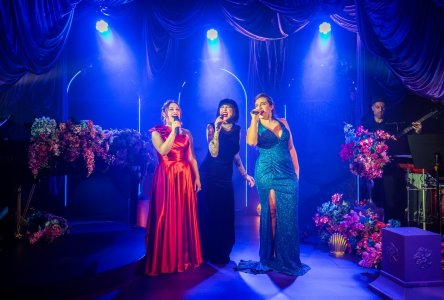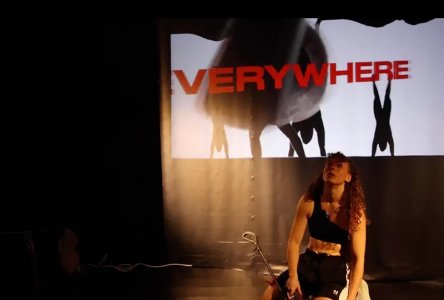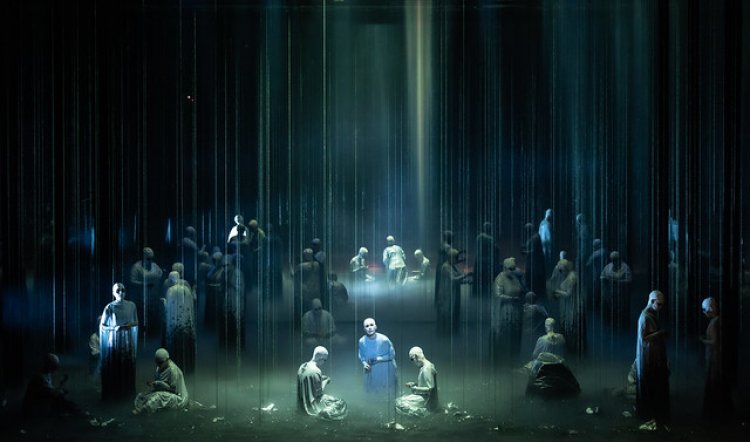
RUSALKA (2025)
RUSALKA, Opera Australia at the Joan Sutherland Theatre, Sydney Opera House, 19 July - 11 August 2025. Photography: Carlita Sari: the watery world of water nymphs; Nicole Car out of water; Ashlyn Tymms at the witching hour
Director Sarah Giles’ sublime Rusalka – a product of the Opera Conference – is now in Sydney after premiering in Perth last year. And what a glorious achievement it is, by all those involved.
Antonín Dvořák’s lusciously romantic score (with libretto by Jaroslav Kvapil, based on Czech fairy tales) is enchanting from the opening moments when a swimmer appears in the lake high above the stage amid swathes of bubbles, conjured by projection designer David Bergman amid delighted gasps from around the auditorium.
Set designer Charles Davis builds on Bergman’s dreamy projections, with huge carp lazily swishing around the lake, with vertical mirrors that infinitely multiply the chorus of hairless, silvery-white water nymphs, while Paul Jackson’s lighting shimmers on water lilies, creates the shadowed depths of forests, and glows on sumptuous palatial pillars and floors.
This Rusalka, by the way, takes place in the lake, rather than on its banks, and that decision alone is breathtaking. And then we have Renée Mulder’s costumes. They range from the already mentioned ethereal water nymphs through to a carapace-burdened Water King, absurdly exaggerated cocktail frocks, Boho and glitter-clad witches, and masked faces that anonymise party-goers. Altogether, a visual feast of wit and colour.
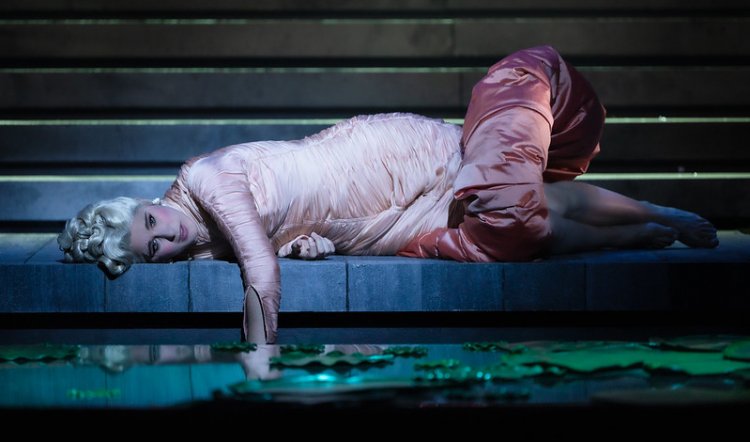
Then there are the singers. In Nicole Car, returning in triumph to Sydney and taking on Rusalka, the production has a powerful actor-soprano who both leads and transcends the visual and dramatic mayhem that surrounds her. Vocally and, when deprived of her voice by sorcery, in conveying her self through face and body alone, she is simply magnificent.
There is vulnerability too when, in the first 25 minutes of the opera, she sings the painfully famous “Song of the Moon,” knowing the audience will be longing for a reprise for the next two and a half hours. And, just as Rusalka and her prince never get what they long for, so the audience is tantalised with moments of leitmotif, but never again the real thing. Dvořák was a mean wizard.
The star soprano is also comical when mimicking the human behaviours of her rival, the Duchess, played and sung strongly by Natalie Aroyan. Happily, there’s not a weak link among the predominantly female cast leaders: Ashlyn Tymms makes a riveting figure of the street sleeper/witch Ježibaba, whose formidable character takes her deep into contralto territory; when she removes Rusalka’s voice through an old but gold magic trick, it’s compelling. Compelling, too, are the Wood Nymphs, Fiona Jopson, Helen Sherman, and Jennifer Bonner. Like animated trees with elongated branches for arms, they harmonise in every way with hilarious if sometimes unnerving results.
As the human handsome prince who falls in love with Rusalka and then fecklessly out again, Australian-born tenor Gerard Schneider makes his home debut with panache. Slightly underpowered when Car, Aroyan, and the orchestra are in full simultaneous flow, he’s nevertheless the embodiment of sigh-worthy alpha maleness and does well enough.
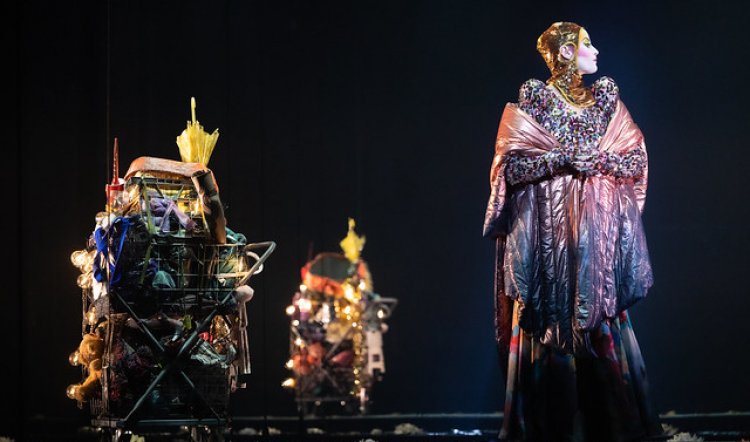
On the other hand, the Vodník (Water King) is given vocal and dramatic gravitas as a stern, rules-based paterfamilias by Warwick Fyfe. He lifts the drama and tragedy to heart-stopping heights, even as Rusalka’s passion for the prince (love a human and be banished forever) is punished by its consequences for him. (His change of heart means a kiss becomes fatal.)
It may be clear by now that I was blown away on the night by an opera I’ve loved since Cheryl Barker sang to the moon nearly 20 years ago, and that I’ve been hoping to see again ever since. In taking the story and music into the dark depths of the lake, Sarah Giles and her team have wrought wonders. All in all, with the OA Orchestra and Chorus confident under the finely wielded baton of Johannes Fritzsch, this Rusalka, as imagined and brought to life in this production, is nothing short of exceptional. It should be given the Moshinsky treatment and marked down for endless repeats.

-c444x300.jpeg)
